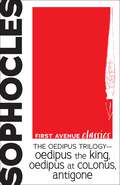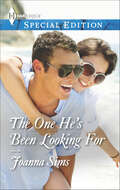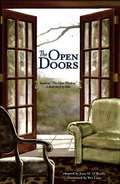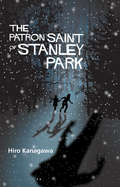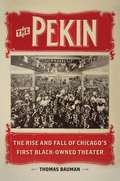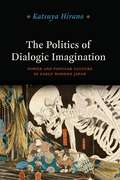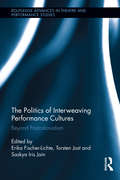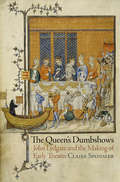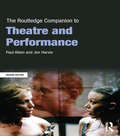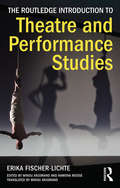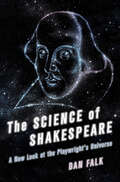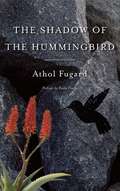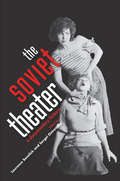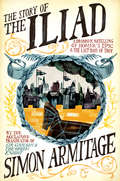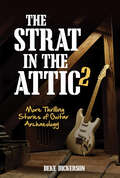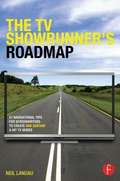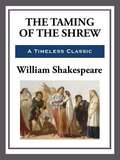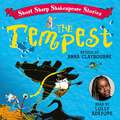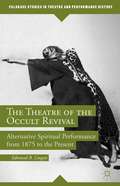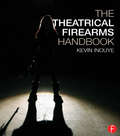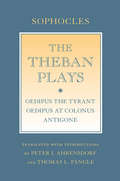- Table View
- List View
The Oedipus Trilogy — Oedipus the King, Oedipus at Colonus, Antigone (First Avenue Classics ™)
by Sophocles SophoclesDisregard for messages from the oracles and gods doesn't turn out well for characters in Greek stories, and Oedipus is no exception. Encompassing murder and betrayal, incest and patricide, this set of three plays follows the life of a man doomed to suffer from birth. Sophocles wrote these classic Greek tragedies in fifth century BCE. This English translation, by F. Storr, was first published in 1912.
The One He's Been Looking For
by Joanna SimsHe'd finally discovered his muse...just as he was losing his sight. Joanna Sims tells the romantic story of a closed-off photographer who opens up for the love he's always needed in her latest book, The One He's Been Looking For! World-famous photographer Ian Sterling had been searching for the perfect woman. And when he finally spotted Jordan Brand he simply had to have her. Her photos would mark his final work. His life as he knew it was slipping through his fingers. The man who bestowed beauty on the world was losing his sight. For rebellious artist Jordan, becoming someone's inspiration should have been laughable. Yet being with Ian made her ridiculously happy. Knowing of the difficult road he was traveling made her love him even more. But Ian refused to pass his disorder along to children-leaving Jordan to choose between the man who held her heart and the family she'd always wanted....
The Open Doors (Fountas & Pinnell LLI Purple #Level R)
by Jane O'ReillyThe Open Doors based on "The Open Window," a short story by Saki
The Ovidian Vogue
by Daniel D. MossThe Roman poet Ovid was one of the most-imitated classical writers of the Elizabethan age and a touchstone for generations of English writers. In The Ovidian Vogue, Daniel Moss argues that poets appropriated Ovid not just to connect with the ancient past but also to communicate and compete within late Elizabethan literary culture.Moss explains how in the 1590s rising stars like Thomas Nashe and William Shakespeare adopted Ovidian language to introduce themselves to patrons and rivals, while established figures like Edmund Spenser and Michael Drayton alluded to Ovid's works as a way to map their own poetic development. Even poets such as George Chapman, John Donne, and Ben Jonson, whose early work pointedly abandoned Ovid as cliché, could not escape his influence. Moss's research exposes the literary impulses at work in the flourishing of poetry that grappled with Ovid's cultural authority.
The Patron Saint of Stanley Park
by Hiro KanagawaSiblings Josh and Jennifer are coping with the loss of their father, who disappeared in a floatplane accident last Christmas Eve. Their mother wants to pretend everything is normal, while Jennifer is angry and isolated and Josh scours the Internet for proof that their father is still alive. So on Christmas Eve, when the children are supposed to catch a bus to their uncle's place, they go to Stanley Park instead and make their way to Prospect Point to honour their father's memory. When a catastrophic windstorm thwarts their plans, Skookum Pete, a strange vagabond who roams the park, takes them to a fantastical bunker beneath the park, where they experience wondrous visions that help them understand the truth about their father.
The Pekin: The Rise and Fall of Chicago's First Black-Owned Theater
by Thomas BaumanIn 1904, political operator and gambling boss Robert T. Motts opened the Pekin Theater in Chicago. Dubbed the "Temple of Music," the Pekin became one of the country's most prestigious African American cultural institutions, renowned for its all-black stock company and school for actors, an orchestra able to play ragtime and opera with equal brilliance, and a repertoire of original musical comedies. A missing chapter in African American theatrical history, Bauman's saga presents how Motts used his entrepreneurial acumen to create a successful black-owned enterprise. Concentrating on institutional history, Bauman explores the Pekin's philosophy of hiring only African American staff, its embrace of multi-racial upper class audiences, and its ready assumption of roles as diverse as community center, social club, and fundraising instrument. The Pekin's prestige and profitability faltered after Motts' death in 1911 as his heirs lacked his savvy, and African American elites turned away from pure entertainment in favor of spiritual uplift. But, as Bauman shows, the theater had already opened the door to a new dynamic of both intra- and inter-racial theater-going and showed the ways a success, like the Pekin, had a positive economic and social impact on the surrounding community.
The Politics of Dialogic Imagination: Power and Popular Culture in Early Modern Japan (Chicago Studies in Practices of Meaning)
by Katsuya HiranoIna"The Politics of Dialogic Imagination," Katsuya Hirano seeks to understand why, with its seemingly unrivaled power, the Tokugawa shogunate of early modern Japan tried so hard to regulate the ostensibly unimportant popular culture of Edo (present-day Tokyo)OCoincluding fashion, leisure activities, prints, and theater. He does so by examining the works of writers and artists who depicted and celebrated the culture of play and pleasure associated with EdoOCOs street entertainers, vagrants, actors, and prostitutes, whom Tokugawa authorities condemned to be detrimental to public mores, social order, and political economy. Hirano uncovers a logic of politics within EdoOCOs cultural works that was extremely potent in exposing contradictions between the formal structure of the Tokugawa world and its rapidly changing realities. He goes on to look at the effects of this logic, examining policies enacted during the next eraOCothe Meiji periodOCothat mark a drastic reconfiguration of power and a new politics toward ordinary people under modernizing Japan. Deftly navigating JapanOCOs history and culture, a"The Politics of Dialogic Imagination"provides a sophisticated account of a country in the process of radical transformationOCoand of the intensely creative culture that came out of it. "
The Politics of Interweaving Performance Cultures: Beyond Postcolonialism (Routledge Advances in Theatre & Performance Studies #33)
by Erika Fischer-Lichte Torsten Jost Saskya Iris JainThis book provides a timely intervention in the fields of performance studies and theatre history, and to larger issues of global cultural exchange. The authors offer a provocative argument for rethinking the scholarly assessment of how diverse performative cultures interact, how they are interwoven, and how they are dependent upon each other. While the term ‘intercultural theatre’ as a concept points back to postcolonialism and its contradictions, The Politics of Interweaving Performance Cultures explores global developments in the performing arts that cannot adequately be explained and understood using postcolonial theory. The authors challenge the dichotomy ‘the West and the rest’ – where Western cultures are ‘universal’ and non-Western cultures are ‘particular’ – as well as ideas of national culture and cultural ownership. This volume uses international case studies to explore the politics of globalization, looking at new paternalistic forms of exchange and the new inequalities emerging from it. These case studies are guided by the principle that processes of interweaving performance cultures are, in fact, political processes. The authors explore the inextricability of the aesthetic and the political, whereby aesthetics cannot be perceived as opposite to the political; rather, the aesthetic is the political. Helen Gilbert’s essay ‘Let the Games Begin: Pageants, Protests, Indigeneity (1968–2010)’won the 2015 Marlis Thiersch Prize for best essay from the Australasian Drama, Theatre and Performance Studies Association.
The Queen's Dumbshows
by Claire SponslerNo medieval writer reveals more about early English drama than John Lydgate, Claire Sponsler contends. Best known for his enormously long narrative poems The Fall of Princes and The Troy Book, Lydgate also wrote numerous verses related to theatrical performances and ceremonies. This rich yet understudied body of material includes mummings for London guildsmen and sheriffs, texts for wall hangings that combined pictures and poetry, a Corpus Christi procession, and entertainments for the young Henry VI and his mother.In The Queen's Dumbshows, Sponsler reclaims these writings to reveal what they have to tell us about performance practices in the late Middle Ages. Placing theatricality at the hub of fifteenth-century British culture, she rethinks what constituted drama in the period and explores the relationship between private forms of entertainment, such as household banquets, and more overtly public forms of political theater, such as royal entries and processions. She delineates the intersection of performance with other forms of representation such as feasts, pictorial displays, and tableaux, and parses the connections between the primarily visual and aural modes of performance and the reading of literary texts written on paper or parchment. In doing so, she has written a book of signal importance to scholars of medieval literature and culture, theater history, and visual studies.
The Routledge Companion to Theatre and Performance (Routledge Companions)
by Paul Allain Jen HarvieWhat is theatre? What is performance? What connects them and how are they different? What events, people, practices and ideas have shaped theatre and performance in the twentieth and twenty-first century? The Routledge Companion to Theatre and Performance offers some answers to these big questions. It provides an analytical, informative and engaging introduction to important people, companies, events, concepts and practices that have defined the complementary fields of theatre and performance studies. This fully updated second edition contains three easy to use alphabetized sections including over 120 revised entries on topics and people ranging from performance artist Ron Athey, to directors Vsevold Meyerhold and Robert Wilson, megamusicals , postdramatic theatre and documentation. Each entry includes crucial historical and contextual information, extensive cross-referencing, detailed analysis and an annotated bibliography. The Routledge Companion to Theatre and Performance is a perfect reference guide for the keen student.
The Routledge Introduction to Theatre and Performance Studies
by Erika Fischer-Lichte Minou Arjomand Ramona MosseErika Fischer-Lichte's introduction to the discipline of Theatre and Performance Studies is a strikingly authoritative and wide ranging guide to the study of theatre in all of its forms. Its three-part structure moves from the first steps in starting to think about performance, through to the diverse and interrelated concerns required of higher-level study: Part 1 - Central Concepts for Theatre and Performance Research - introduces the language and key ideas that are used to discuss and think about theatre: concepts of performance; the emergence of meaning; and the theatrical event as an experience shared by actors and spectators. Part 1 contextualizes these concepts by tracing the history of Theatre and Performance Studies as a discipline. Part 2 - Fields, Theories and Methods - looks at how to analyse a performance and how to conduct theatre-historiographical research. This section is concerned with the 'doing' of Theatre and Performance Studies: establishing and understanding different methodological approaches; using sources effectively; and building theoretical frameworks. Part 3 - Pushing Boundaries - expands on the lessons of Parts 1 and 2 in order to engage with theatre and performance in a global context. Part 3 introduces the concept of 'interweaving performance cultures'; explores the interrelation of theatre with the other arts; and develops a transformative aesthetics of performance. Case studies throughout the book root its theoretical discussion in theatrical practice. Focused accounts of plays, practitioners and performances map the development of Theatre and Performance Studies as an academic discipline, and of the theatre itself as an art form. This is the most comprehensive and sophisticated introduction to the field available, written by one of its foremost scholars.
The Science of Shakespeare: A New Look at the Playwright's Universe
by Dan FalkWilliam Shakespeare lived at a remarkable time—a period we now recognize as the first phase of the Scientific Revolution. New ideas were transforming Western thought, the medieval was giving way to the modern, and the work of a few key figures hinted at the brave new world to come: the methodical and rational Galileo, the skeptical Montaigne, and—as Falk convincingly argues—Shakespeare, who observed human nature just as intently as the astronomers who studied the night sky.In The Science of Shakespeare, we meet a colorful cast of Renaissance thinkers, including Thomas Digges, who published the first English account of the "new astronomy" and lived in the same neighborhood as Shakespeare; Thomas Harriot—"England's Galileo"—who aimed a telescope at the night sky months ahead of his Italian counterpart; and Danish astronomer Tycho Brahe, whose observatory-castle stood within sight of Elsinore, chosen by Shakespeare as the setting for Hamlet—and whose family crest happened to include the names "Rosencrans" and "Guildensteren." And then there's Galileo himself: As Falk shows, his telescopic observations may have influenced one of Shakespeare's final works.Dan Falk's The Science of Shakespeare explores the connections between the famous playwright and the beginnings of the Scientific Revolution—and how, together, they changed the world forever.
The Shadow of the Hummingbird
by Athol Fugard Paula Fourie"The greatest active playwright in the English-speaking world."--Time"If there is a more urgent and indispensable playwright in world theater than South Africa's Athol Fugard, I don't know who it could be."--Newsweek"Athol Fugard can say more with a single line than most playwrights convey in an entire script."--VarietyLegendary theatre artist Athol Fugard returns to the stage for the first time in fifteen years in this, his latest work. The Shadow of the Hummingbird tells the story of an ailing man in his eighties and the afternoon spent with his ten year-old grandson. In a charming meditation on the beauty and transience of the world around us, Fugard continues to mine the depths of the human spirit with profound empathy and heart. The text of the play includes an introductory Prelude by Paula Fourie with extracts from Fugard's unpublished notebooks.Athol Fugard has been working in the theater as a playwright, director, and actor for more than fifty years. In 2011, he received a Special Tony Award for Lifetime Achievement in the Theatre, and he was the inaugural Humanitas Visiting Professor of Drama at Oxford University. His plays include Blood Knot, Boesman and Lena, Statements After an Arrest Under the Immorality Act, Sizwe Banzi Is Dead, 'Master Harold' . . . and the Boys, The Road to Mecca, My Children! My Africa! and The Blue Iris.
The Shakespearean Archive
by Alan GaleyWhy is Shakespeare so often associated with information technologies and with the idea of archiving itself? Alan Galey explores this question through the entwined histories of Shakespearean texts and archival technologies over the past four centuries. In chapters dealing with the archive, the book, photography, sound, information, and data, Galey analyzes how Shakespeare became prototypical material for publishing experiments, and new media projects, as well as for theories of archiving and computing. Analyzing examples of the Shakespearean archive from the seventeenth century to today, he takes an original approach to Shakespeare and new media that will be of interest to scholars of the digital humanities, Shakespeare studies, archives, and media history. Rejecting the idea that current forms of computing are the result of technical forces beyond the scope of humanist inquiry, this book instead offers a critical prehistory of digitization read through the afterlives of Shakespeare's texts.
The Soviet Theater
by Mr Laurence Senelick Mr Sergei OstrovskyIn this monumental work, Laurence Senelick and Sergei Ostrovsky offer a panoramic history of Soviet theater from the Bolshevik Revolution to the eventual collapse of the USSR. Making use of more than eighty years' worth of archival documentation, the authors celebrate in words and pictures a vital, living art form that remained innovative and exciting, growing, adapting, and flourishing despite harsh, often illogical pressures inflicted upon its creators by a totalitarian government. It is the first comprehensive analysis of the subject ever to be published in the English language.
The Story of the Iliad: A Dramatic Retelling of Homer’s Epic and the Last Days of Troy
by Simon ArmitageAward-winning poet Simon Armitage dramatizes the story of Troy, animating this classic epic for a new generation of readers. Following his highly acclaimed dramatization of the Odyssey, Simon Armitage here takes on the fate of Troy, bringing Homer's Iliad to life with refreshing imaginative vision. In the final days of the Trojan War, the Trojans and the Greeks are caught in a bitter stalemate. Exhausted and desperate after ten years of warfare, gods and men battle among themselves for the glory of recognition and a hand in victory. Cleverly intertwining the Iliad and the Aeneid, Armitage poetically narrates the tale of Troy to its dire end, evoking a world plagued by deceit, conflict, and a deadly predilection for pride and envy. As with the Odyssey, Armitage reveals the echoes of ancient myth in our contemporary war-torn landscape, and reinvigorates the classic epics with adventure, passion, and, surprisingly, Shakespearean wit.
The Strat in the Attic 2: More Thrilling Stories of Guitar Archaeology
by Deke DickersonDon’t fret! The music historian and guitar sleuth brings you more astounding stories of rare guitar finds and the legends who owned them.Do you dream of finding a 1954 Stratocaster or 1952 Gibson Les Paul online, at a garage sale, or in the local penny saver? How about virtually rubbing elbows with one of your favorite rock legends? Following up his first-of-its-kind The Strat in the Attic, musician, journalist, and “guitarchaeologist” Deke Dickerson shares the stories behind dozens of more astounding finds including:A rarer-than-hens-teeth 1966 Hallmark Swept-Wing that originally belonged to Robbie Krieger of the Doors, stashed away in an attic in Alaska for forty years!A crazy-valuable 1958 Gibson Flying V belonging to a Chicago bluesman—who, it turns out, also happens to have an equally rare 1958 Gibson Explorer!An out-of-the-blue, a “to whom it may concern” email leads the author to a trailer park in Salem, Oregon, where one of Bob Wills and the Texas Playboys’ original 1940s Epiphone Emperor archtops is waiting to be purchased for a song!Luthier R.C. Allen relates the tales of buying Nat “King” Cole Trio guitarist Oscar Moore’s Stromberg Master 400 archtop and of being gifted a 1953 Standel amp from Merle Travis!Buddy Merrill, the amazingly talented guitarist from the Lawrence Welk show, gives his 1970 Micro-Frets Huntington to the author, but only if he “promises to PRACTICE.”Photos of the guitars and other exciting memorabilia round out a package that no vintage-guitar aficionado will want to be without!“The man knows how to tell a great story.” —Jonathan Kellerman, #1 New York Times–bestselling author
The Structure and Performance of Euripides' Helen
by C. W. MarshallUsing Euripides' play, Helen, as the main point of reference, C. W. Marshall's detailed study expands our understanding of Athenian tragedy and provides new interpretations of how Euripides created meaning in performance. Marshall focuses on dramatic structure to show how assumptions held by the ancient audience shaped meaning in Helen and to demonstrate how Euripides' play draws extensively on the satyr play Proteus, which was part of Aeschylus' Oresteia. Structure is presented not as a theoretical abstraction, but as a crucial component of the experience of performance, working with music, the chorus and the other plays in the tetralogy. Euripides' Andromeda in particular is shown to have resonances with Helen not previously described. Arguing that the role of the director is key, Marshall shows that the choices that a director can make about role doubling, gestures, blocking, humour, and masks play a crucial part in forming the meaning of Helen.
The TV Showrunner's Roadmap: 21 Navigational Tips for Screenwriters to Create and Sustain a Hit TV Series
by Neil LandauIf you've ever dreamed of being in charge of your own network, cable, or web series, 'The TV Showrunner's Roadmap' provides you with the tools for creating, writing, and managing your own hit show. Combining his 20+ years as a working screenwriter and UCLA professor, Neil Landau expertly guides you through 21 essential insights to the creation of a successful show, and takes you behind the scenes for exclusive and enlightening interviews with showrunners from some of TV's most lauded series.
The Taming of the Shrew
by William ShakespeareFolger Shakespeare Library The world's leading center for Shakespeare studies Each edition includes: Freshly edited text based on the best early printed version of the play Full explanatory notes conveniently placed on pages facing the text of the play Scene-by-scene plot summaries A key to famous lines and phrases An introduction to reading Shakespeare's language An essay by an outstanding scholar providing a modern perspective on the play Illustrations from the Folger Shakespeare Library's vast holdings of rare books Essay by Karen Newman The Folger Shakespeare Library in Washington, D.C., is home to the world's largest collection of Shakespeare's printed works, and a magnet for Shakespeare scholars from around the globe. In addition to exhibitions open to the public throughout the year, the Folger offers a full calendar of performances and programs.
The Tempest (Short, Sharp Shakespeare Stories #28)
by Anna ClaybourneBe not afeard; the isle is full of noises...A powerful storm, a dramatic shipwreck, an enchanted island, a sorcerer's daughter and a handsome prince... Listen on, through magic and mystery, to discover the spell-binding story at the heart of The Tempest, one of Shakespeare's best-loved plays.As well as the story, this audiobook contains information about the background to The Tempest, its major themes, language, and Shakespeare's life during the time he was writing the play. Magic, and its meaning in 16th century England, are also examined, to give some context in which the play was written.The Short, Sharp Shakespeare series consists of six books that retell Shakespeare's most famous plays in modern English. Fun sound effects and atmospheric music accompany each narration, making them a great introduction to "the Bard" for children.(P) 2023 Hodder & Stoughton Limited
The Theatre Of The Occult Revival
by Edmund B. LinganBased on field research and archival study, this book offers an in-depth exploration of the religious foundations, political and social significance, and aesthetic aspects of the theatre created by several of the most influential leaders of the Occult Revival: Katherine Tingley, Rudolf Steiner, Marie Steiner-von Sivers, Aleister Crowley, Alexander Mathews, and Gerald Gardner. The Occult Revival was an international surge of interest in the supernatural, magic, and Eastern mysticism that thrived in Europe and the United States between the late nineteenth-century and the mid-twentieth-century. By studying the theatre that was developed in affiliation with occult movements, this book shows how theatre contributed to the complication and fragmentation of Western religious culture during the turn-of-the-century Occult Revival and how theatre continues to play a part in the development of occult rituals and beliefs.
The Theatrical Firearms Handbook
by Kevin InouyeThe Theatrical Firearms Handbook is the essential guide to navigating the many decisions that are involved in the safe and effective use of firearm props for both the stage and screen. It is an invaluable resource for fight choreographers, props designers, backstage crew, directors, actors, stage managers, and more, at all levels of experience. Written in an informal and entertaining manner, with over 100 illustrations, it establishes baseline safety protocol while empowering performers and designers to tell their story of conflict in a way that makes the most of both established convention and current tools of the trade. Within these pages you'll find practical instruction couched in the language of theatre and film, making firearms technology and concepts approachable to dramatic artists without any dumbing-down of the subject material. This handbook is equally at home within the worlds of academic training, professional performance, and independent or community theatre and video productions.
The Theatrical Public Sphere
by Christopher B. BalmeThe concept of the public sphere, as first outlined by German philosopher Jürgen Habermas, refers to the right of all citizens to engage in debate on public issues on equal terms. In this book, Christopher B. Balme explores theatre's role in this crucial political and social function. He traces its origins and argues that the theatrical public sphere invariably focuses attention on theatre as an institution between the shifting borders of the private and public, reasoned debate and agonistic intervention. Chapters explore this concept in a variety of contexts, including the debates that led to the closure of British theatres in 1642, theatre's use of media, controversies surrounding race, religion and blasphemy, and theatre's place in a new age of globalised aesthetics. Balme concludes by addressing the relationship of theatre today with the public sphere and whether theatre's transformation into an art form has made it increasingly irrelevant for contemporary society.
The Theban Plays: "Oedipus the Tyrant"; "Oedipus at Colonus"; "Antigone"
by Sophocles Peter J. Ahrensdorf Thomas L. PangleThe timeless Theban tragedies of Sophocles--Oedipus the Tyrant, Oedipus at Colonus, and Antigone--have fascinated and moved audiences and readers across the ages with their haunting plots and their unforgettable heroes and heroines. Now, following the best texts faithfully, and translating the key moral, religious, and political terminology of the plays accurately and consistently, Peter J. Ahrensdorf and Thomas L. Pangle allow contemporary readers to study the most literally exact reproductions of precisely what Sophocles wrote, rendered in readily comprehensible English.These translations enable readers to engage the Theban plays of Sophocles in their full, authentic complexity, and to study with precision the plays' profound and enduring human questions. In the preface, notes to the plays, and introductions, Ahrensdorf and Pangle supply critical historical, mythic, and linguistic background information, and highlight the moral, religious, political, philosophic, and psychological questions at the heart of each of the plays. Even readers unfamiliar with Greek drama will find what they need to experience, reflect on, and enjoy these towering works of classical literature.
